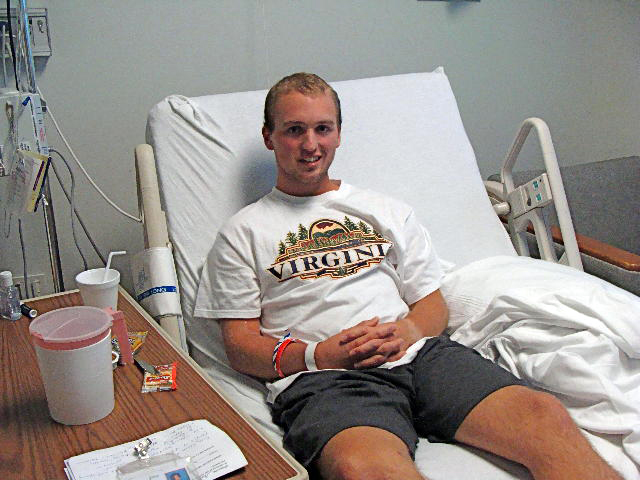
Scott Riley, a sophomore Virginia Tech student from Midlothian, Va., is resting at home after what doctors referred to as a “close call” with neisseri meningitis, a stubborn morph of the bacteria that resists many antibiotics. Before that, the 19-year-old spent more than a week in the hospital, much of that time in intensive care.
“I am thankful to the staff of the hospital and to my family and friends,” said Riley, as he sat in his hospital bed a day before he was to be discharged. “I feel lucky, but it hasn’t really hit me yet.” Riley is majoring in fisheries and eventually wants to work on cleaning up the Chesapeake Bay.
Riley went to the emergency room at Montgomery Regional Hospital at about noon on September 24 with flu-like symptoms. Doctors examined him and found nothing to suggest meningitis such as the headaches or neck aches that typically accompany the illness. But when Scott returned to the hospital around midnight, doctors became more concerned.
“We suspected Meningitis, and shortly after he arrived a nurse noticed a severe rash was forming on his legs and feet,” said Marybeth Coluni, a nurse and infection prevention specialist at Montgomery Regional Hospital. “Right then we felt it was meningitis, and a lumbar puncture proved it.”
Despite treatment through the overnight hours with Rocephin, a broad-spectrum antibiotic commonly used to treat meningitis, Riley’s case worsened. “He went into an altered state of consciousness, and we put him on a ventilator,” said Coluni.
At about 8 a.m. doctors sent him to Lewis-Gale Medical Center in Salem where a critical care and pulmonary specialist could see him. Dr. David Killeen realized the traditional therapy was not working and administered Xigris, (pronounced ZY-griss) a drug not commonly used to fight meningitis.
“I saw his organs shutting down from the bacteria, and felt Xigris was the best way to combat the effects of the illness. Though it is not a typical treatment, it proved to be the correct one in Scott’s case,” said Kileen.
HCA Southwest Virginia President Victor Giovanetti had praise for the staff at both hospitals. “Our staff handled this case exactly the way we hoped they would when we put our integrated systems in place,” said Giovanetti. “We place a high priority on getting patients to the right specialist unimpeded by delays and red tape. We are so pleased to be able to tell of Scott’s remarkable recovery.”
Riley says he remembers little from the time he arrived at Montgomery Regional, to the time he woke up in the I.C.U. at Lewis Gale. Of his brush with death he said only, “I had good doctors, good timing and I was lucky.”


